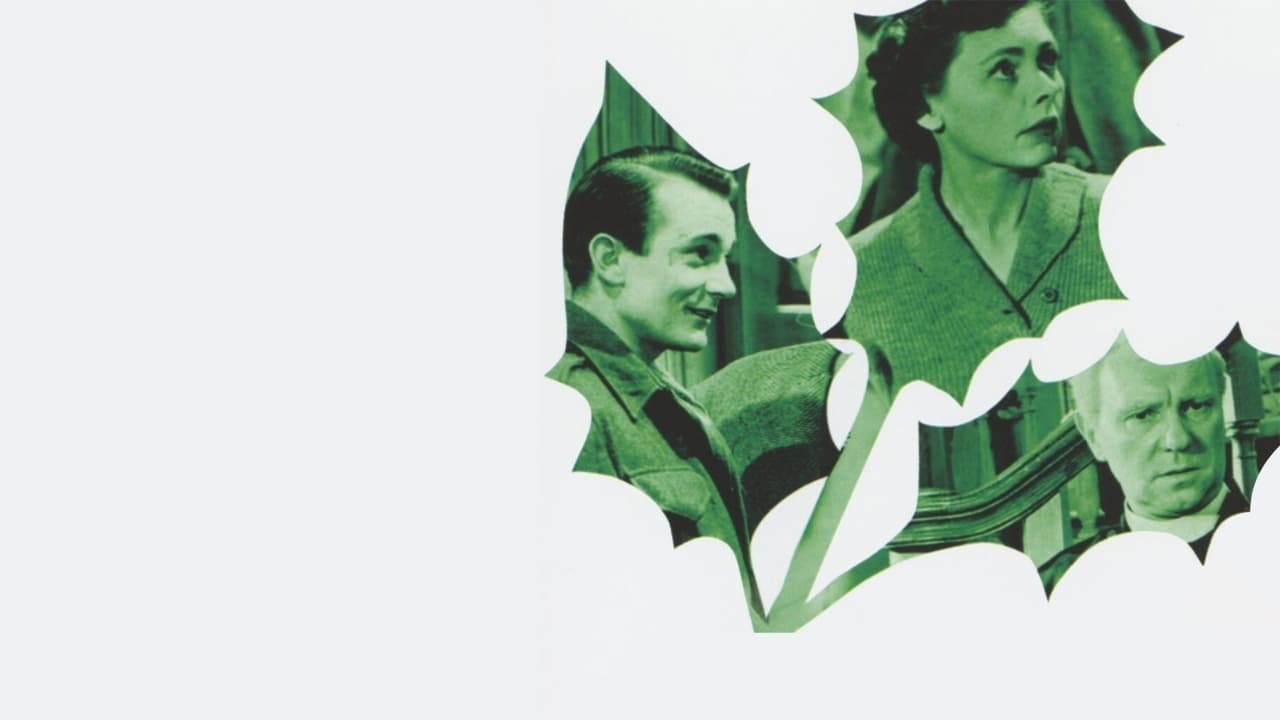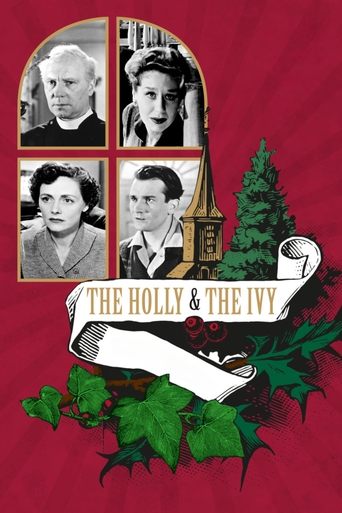

The Holly and the Ivy is a far cry from the usual Christmas story since it is more a family drama set during the Christmas season. It is a powerful story with excellent acting as the group gets together in a country village north of London in 1948. The family made up of father, aunts, grown children and two male friends come together at the vicarage of the father, the parson in a local church. Ralph Richardson and Margaret Leighton, as father and daughter, have the key roles and are bolstered by a strong supporting cast, including Denholm Eliot and Celia Johnson. During the evening and Christmas morning, family matters that had been ignored or kept secret, come to the fore. After a series of uncomfortable incidents and heart-to-heart talks, things change and everyone finds comfort and possibly a deeper purpose in this Christmas. This is certainly a serious movie and totally entertaining. Unlike many of the fantasy films we see at Christmas, this offers a dose of reality. The sets are very plain as they were in most British dramas of that era but the acting is superb. It teaches the audience that Christmas and family difficulties are often played out together. In that sense, family Christmas gatherings may not be that different than they were 60 some years ago.
... View MoreI saw this in England when it was new and have wanted so much to see it again but it was never available. I am so thrilled to report that I just received it on DVD in the North American format. I assume I cannot mention the vendor but I found it by searching the internet. Although it is somewhat dated it is nevertheless the only meaningful realistic Christmas movie I've ever seen. It depicts the sorrow that ensues when family members feel they cannot be honest with each other. And it also shows how easy it is to place a clergyman in an ivory tower where he neither wants nor deserves to be. The acting from a renown cast prevents it from sinking into maudlin sentimentality.
... View MoreAs various members of the Gregory family gather for Christmas, secrets are revealed and tempers flare.Clunky editing, theatrical directing and ridiculous casting choices should leave this film a creaky and dated mess, yet somehow it radiates a seasonal (and very British) charm. Richardson is hilariously miscast as the Gregory patriarch, donning 'old man' make-up and wandering in and out of a dodgy Oirish accent. As his 31 year old daughter Jenny, 43 year old Johnson fares better, convincing and always watchable as the dutiful child resigning herself to a future of servility. 30 year old Elliot is astonishingly youthful as twenty-something son Mick, and 30 year old Leighton captivating as troubled daughter Margaret.Obviously an adaptation from the stage, many of the scenes play like theatre, although all credit to the cast for mostly toning done the theatrics. Best moment? Margaret telling Jenny about the tragedies of her life as they wash up after Christmas Eve dinner. Leighton and Johnson beautifully convey the shock and grief of Margaret's story, Johnson particularly fine as she reacts to the dreadful story, allowing surprise and delight turn to horror.Yes The Holly And The Ivy is from another age, yes it has a theatrical flavour, yes Richardson is obviously far too young to play the elderly parson... nevertheless it remains a charming and quite moving seasonal favourite of mine.
... View MoreThough he wrote several plays and the screenplay for the David Lean version of Hobson's Choice Wynyard Browne's main claim to fame was that he was at Cambridge with Michael Redgrave. The Holly And The Ivy was arguably his most successful play and his adaptation for the screen reflects - despite some misguided 'opening out' - its peculiar 'English' quality. I haven't seen the play but I HAVE seen enough plays to make an educated guess that it was a one-set effort with Act One setting the scene, a parsonage/vicarage in rural Norfolk, and bringing in the family members piecemeal to celebrate Christmas with those members in turn bringing their emotional baggage. The patriarch, Ralph Richardson on top of his game, is a widower with three children, one, Celia Johnson, the stay-at-home devoted daughter prepared to sacrifice her own happiness to take care of the elderly clergyman, one, Margaret Leighton, a high-flying career woman in London, and one, Denholm Elliott, a callow youth doing his 'National Service' in the British army and these three are supplemented by two aunts, Maureen Delaney and Margaret Halston. Arguably Browne originally wrote a tight, well-made family drama which benefited from the one set but he - or the producer - has seen fit to introduce us to the children/aunts prior to their arrival for the Christmas celebrations which involved creating supplementary characters i.e., Elliott's superiors in the army who place him on a charge and grant him a pass for the holidays. That cavil to one side the bulk of the film is yet another cross between a time capsule and a valentine to an England long gone the way of the dinosaur except of course that in 1952 the England depicted still existed. Browne offers a basic conflict; Celia Johnson is in love with John Gregson who in turn has a job opportunity abroad. She would dearly love to go with him but feels unable to ask her successful sister to give up her career and return home - the aunts are themselves elderly and set in their ways and Mick (Elliott) is a non-starter. Someone has remarked on these boards that Celia Johnson is too old to play a thirty one year old and whilst that's probably - and certainly biologically - true she's such a fine actress that the gets away with it easily though she is hardly being extended here in which she basically reprises her Laura Jesson in 'Brief Encounter', in love with one man but bound to another, the difference being that in the former she was bound to a husband and here she is bound to a father. John Gregson, who plays her potential husband, was never much more than a personable leading man of the solid, dependable kind, the tweedy, pipe-smoking stock character so beloved of British dramatists and here he's required to do little more than offer his impression of a mahogany sideboard. Margaret Leighton turns in yet another variant of the beautiful ice-maiden longing to show her cuddly kitten side and it is her character - obliged to conceal an illegitimate child that today she would flaunt - that perhaps illustrates the gap between life half a century ago and today. Somehow it all comes together and makes for a warm, nostalgic viewing experience.
... View More